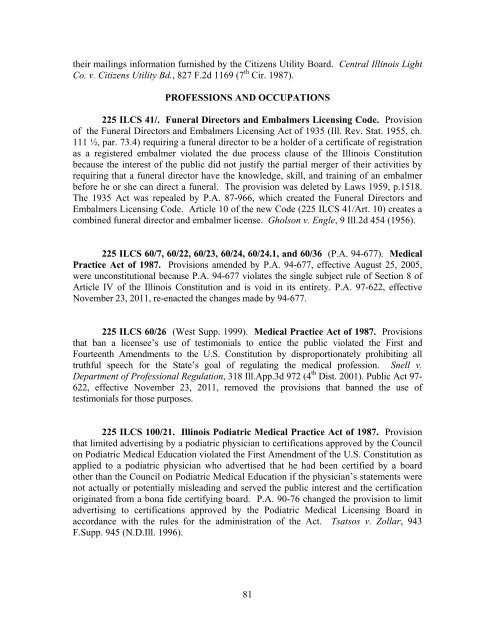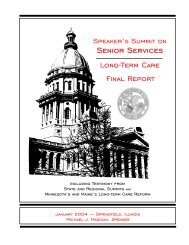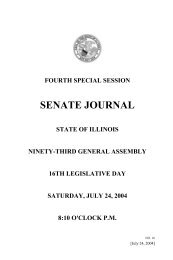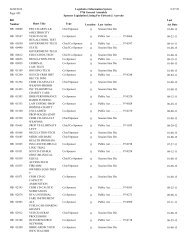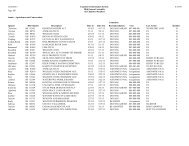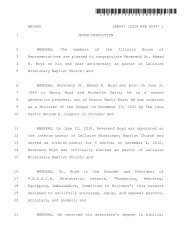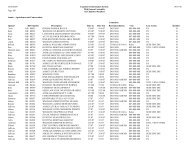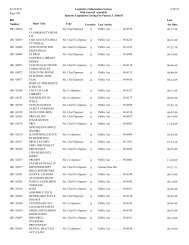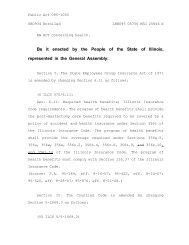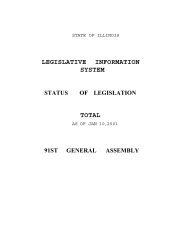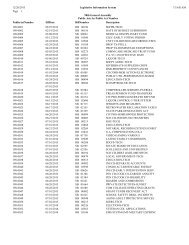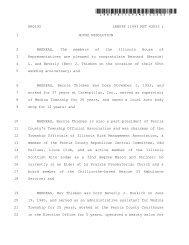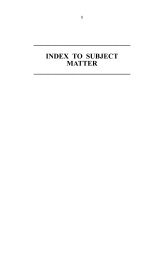2011 CASE REPORT - Illinois General Assembly
2011 CASE REPORT - Illinois General Assembly
2011 CASE REPORT - Illinois General Assembly
Create successful ePaper yourself
Turn your PDF publications into a flip-book with our unique Google optimized e-Paper software.
their mailings information furnished by the Citizens Utility Board. Central <strong>Illinois</strong> Light<br />
Co. v. Citizens Utility Bd., 827 F.2d 1169 (7 th Cir. 1987).<br />
PROFESSIONS AND OCCUPATIONS<br />
225 ILCS 41/. Funeral Directors and Embalmers Licensing Code. Provision<br />
of the Funeral Directors and Embalmers Licensing Act of 1935 (Ill. Rev. Stat. 1955, ch.<br />
111 ½, par. 73.4) requiring a funeral director to be a holder of a certificate of registration<br />
as a registered embalmer violated the due process clause of the <strong>Illinois</strong> Constitution<br />
because the interest of the public did not justify the partial merger of their activities by<br />
requiring that a funeral director have the knowledge, skill, and training of an embalmer<br />
before he or she can direct a funeral. The provision was deleted by Laws 1959, p.1518.<br />
The 1935 Act was repealed by P.A. 87-966, which created the Funeral Directors and<br />
Embalmers Licensing Code. Article 10 of the new Code (225 ILCS 41/Art. 10) creates a<br />
combined funeral director and embalmer license. Gholson v. Engle, 9 Ill.2d 454 (1956).<br />
225 ILCS 60/7, 60/22, 60/23, 60/24, 60/24.1, and 60/36 (P.A. 94-677). Medical<br />
Practice Act of 1987. Provisions amended by P.A. 94-677, effective August 25, 2005,<br />
were unconstitutional because P.A. 94-677 violates the single subject rule of Section 8 of<br />
Article IV of the <strong>Illinois</strong> Constitution and is void in its entirety. P.A. 97-622, effective<br />
November 23, <strong>2011</strong>, re-enacted the changes made by 94-677.<br />
225 ILCS 60/26 (West Supp. 1999). Medical Practice Act of 1987. Provisions<br />
that ban a licensee’s use of testimonials to entice the public violated the First and<br />
Fourteenth Amendments to the U.S. Constitution by disproportionately prohibiting all<br />
truthful speech for the State’s goal of regulating the medical profession. Snell v.<br />
Department of Professional Regulation, 318 Ill.App.3d 972 (4 th Dist. 2001). Public Act 97-<br />
622, effective November 23, <strong>2011</strong>, removed the provisions that banned the use of<br />
testimonials for those purposes.<br />
225 ILCS 100/21. <strong>Illinois</strong> Podiatric Medical Practice Act of 1987. Provision<br />
that limited advertising by a podiatric physician to certifications approved by the Council<br />
on Podiatric Medical Education violated the First Amendment of the U.S. Constitution as<br />
applied to a podiatric physician who advertised that he had been certified by a board<br />
other than the Council on Podiatric Medical Education if the physician’s statements were<br />
not actually or potentially misleading and served the public interest and the certification<br />
originated from a bona fide certifying board. P.A. 90-76 changed the provision to limit<br />
advertising to certifications approved by the Podiatric Medical Licensing Board in<br />
accordance with the rules for the administration of the Act. Tsatsos v. Zollar, 943<br />
F.Supp. 945 (N.D.Ill. 1996).<br />
81


